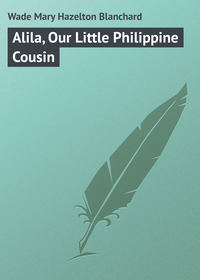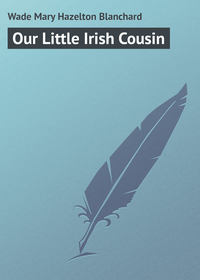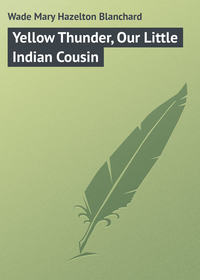 полная версия
полная версияOur Little Porto Rican Cousin
The party soon cross a bridge over a little stream. There they see two women standing nearly knee-deep in the water. They are washing clothes and having a sociable chat at the same time. Two large, flat stones serve as scrubbing boards, and each one of the women holds a club in her hands.
"What is that for?" one asks. To beat the dirt out of the clothes! The garments are spread on the stones, rubbed with some native berries (instead of soap), then pounded with the clubs. Not a delicate way to handle fine linen, to be sure; but the women seem to enjoy their work, and stop every few minutes to sit on the banks and smoke their pipes.
When the party have nearly reached the seashore, the road leads through thick woods. Suddenly they hear a great scuttling among the trees. The driver stops his horses, and every one looks to see what is the matter.
It is nothing more nor less than an army of land-crabs on their yearly journey from the mountains to the sea. The children have often found one of them in the garden or the woods near the house, but such a number as this, they have never seen or heard before.
These land-crabs can fight, and can frighten the horses greatly, if they should choose to take the road. So Pedro very wisely uses the whip, and the party soon leave this queer army behind them. The crabs make a dainty dish when served with lime-juice and Cayenne pepper, and Manuel and Dolores are very fond of them served in this way.
A turn in the road brings the ocean in view. Dolores claps her hands in delight, and cries:
"Oh, what a lovely time we will have! I wonder who will find the most curiosities, Manuel, you or I."
Even the sober-faced duenna looks pleased as they drive out upon a smooth beach. How beautiful the ocean looks to-day! It is such a wonderful blue; much like the colour of the sapphire, and not at all like the waters of the northern seas.
The children take little baskets on their arms and trot about barefooted to see what they can find. It is a perfect paradise among beaches. Their American brothers and sisters would dance for joy at the sight of so many kinds of beautiful shells. And the starfish! Manuel finds one big fellow as much as ten inches across. It is not flat like those seen in the temperate zone, but at least six inches through the middle of his horny body. The little boy cannot get him off the rock to which he has fastened, but Pedro comes, and even he has to use all his strength to pull him away. A New York merchant is to visit the children's father very soon, and Manuel wants to send this starfish to his little son.
But there are other kinds of starfish here that are pretty and delicate. Dolores finds a dear little daisy-star only half an inch across, with fringes on its sides, and, a moment after, her sister picks up a fern-star.
What delights the children most of all are the bits of coral washed up by the waves. Some of the pieces are red, some black, and others white. One is quite large, and is formed in the shape of a fan, while another spray looks like a mushroom.
After luncheon is over, Manuel says:
"Dolores, let's try to find some sea-anemones. Do you see that rocky cliff at the end of the beach? Perhaps if we go there we can see some."
The children start off once more, and soon are climbing up over the rock. They creep along till they are able to look over its edge as it juts out over the water.
What a wonderful sight meets their eyes! It is the flower garden of the sea. Deep down under the clear waters they see many things living and growing that look for all the world like roses and marigolds, pinks and buttercups. What wonderful colours they have! Coral is indeed beautiful, but it cannot compare with the sea-anemones.
Manuel and his sister fairly hold their breath with delight.
"Oh, Dolores, isn't it strange that those lovely things are animals and not plants! There they stay in one place for ever, yet they are alive like the coral polyps. We must get Teresa to come and see them, too. She never saw them growing; I've heard her say so."
Manuel whispers these words as though he fears the anemones may hear him and hide themselves from his sight. Dolores answers, in her soft voice:
"Manuel, did you ever think about what our teacher told us, that the bottom of the ocean is like the land, with hills and valleys, mountains and caves? Many kinds of creatures live there, just as other kinds live on the earth; but it seems to me that the coral polyps and the sea-anemones are the strangest of all."
When the children get back to the others, they beg Alfonso to get a boat and row them around to where the anemones are growing. Perhaps they can reach some of them. But he tells them that their father has forbidden him to take them out on the water, for the terrible blue shark dares to come quite close to the shore, and, even in a row-boat, they could not be sure of safety if a shark should follow them.
He then tells them of adventures with sharks by people living near their own home.
After these stories Manuel and Dolores are quite willing to give up a row after anemones, nor do they care to go in bathing, even close to the shore.
The time comes all too soon to go home, and all enjoy the ride in the cool evening air. They have not travelled far before the moon rises and sends its light down through the tree-tops.
Dolores happens to be looking out of the carriage, when she sees an ugly-looking animal peering out from behind a bush. It is an iguana, with jaws and mouth like an alligator. He looks fierce enough to devour any one, but Alfonso assures the party that he is really a very timid creature, and will not fight unless he is cornered and cannot get away. He likes to live quietly by himself in the trees and bushes, and no doubt is afraid of the horses.
After awhile the children grow sleepy and doze in each other's arms till home is reached. Their father and mother are watching, and the dinner has been kept waiting until they should arrive.
CHAPTER XI.
THE WONDERFUL CAVE
They have so much to tell, it seems as though they had been gone a week. Their mother is most interested in hearing about the anemones, while their father wishes he could have been with them when they saw the land-crabs.
"It makes me think," says he, "of a wonderful trip I made when I was quite a young man. I met land-crabs that day in a much stranger place than you ever saw them, Manuel. Did I ever tell you children about my visit to the 'Great Caves'?"
Manuel and Dolores draw close to their father's side and exclaim together:
"Why, no, papa. Oh, do tell us, please. I never even heard of them."
The planter smiles and answers: "It is not strange, my dears, for there are people living within a much shorter distance of these caves who have never heard of them, as well as yourselves. It is, indeed, odd; but you will yet see the day when travellers from distant lands will visit our island for the sake of seeing the wonderful things hidden away in those very caverns.
"When I was younger, I was always looking for adventures. My father was a rich man, and I was allowed to do very much as I liked. So when some friends of mine asked me to join them in a trip to the caves, I was much pleased. They told me the ride would be tiresome and perhaps dangerous, but I liked the idea far better for that very reason.
"We started out early one morning. Two guides went with us. They were men who had been in the caves many times. They knew the best way to reach them. We carried coils of rope and a roll of pitch lights, as well as a good luncheon.
"If we could have gone straight up the side of the mountain, it would have been a short trip; but the trail led up and down, in and out. Now we had to climb a narrow ridge, and then descend again into a valley. One of these ridges was so steep that I had to hold on to the pommel of the saddle with all my might. I shut my eyes at the same time. I feared I would grow dizzy and slip from the back of the horse down the side of the precipice.
"But this was for only a short distance. Most of the road was very beautiful and lined with fruit-trees. Sometimes we could have picked great ripe oranges without dismounting; in many a narrow pass the clusters of bananas hung down so near us we had to bend our heads to keep from being knocked from the saddles.
"At last we had climbed so high we found ourselves with mountain tops on every side. Far below lay an immense coffee plantation. We could see the great drying-pans near the buildings. Only a short distance ahead of us was a white cliff of limestone. Here lay the caves we had come to visit.
"We tied our horses to some trees, and crept, hand and foot, up through a narrow gorge. Its sides were walls of rock, and its roof was made of vines, ferns, and overhanging fruit-trees. How sweet and cool the air seemed!
"Yes, straight in front of us we could just see two great black holes. These were the doorways of the caves. And now the guides handed each one of us a lighted torch. The burning gum made a sweet incense as it sputtered. It gave the only light we should have for many hours.
"The guides slowly led the way into the dark cavern ahead. The floor was wet and muddy, and we had to take care not to slip.
"Ugh! there were numbers of great black spiders here. Their bite might be poisonous, and we took care not to lay our hands against the walls where they travelled up and down. The place was damp and slippery. There was certainly nothing beautiful to be seen yet.
"Hark! There was a rustling sound over our heads. It grew louder and louder, until we could not hear each other's voices. As we looked up into the darkness, we could see we had startled an army of bats. There were thousands of them. Yes, surely, many thousands. You wouldn't have enjoyed their flying around you one bit, Manuel, good little huntsman even as you are. And as for you, my precious Dolores, I fear you would have screamed and begged to be taken home.
"Over our heads we could hear the sound of running water all the time. We kept bravely on. It began to grow lighter, and we could see several openings in front of us. Choosing one of these, we crept through a narrow passage and found ourselves at once in a vast hall. It was like Aladdin's palace, which, you remember, was brilliant with beautiful gems.
"I looked up to the high roof and saw hundreds of sparkling white pendants. Some of them were quite small, but others reached down so far that I could touch them. They shone like the finest marble. They were made by the water trickling through the roof and leaving particles of lime as it slowly made its way downward. Such pendants are called stalactites. Some of them were tinted a beautiful blue or green. This was because the water had passed through some mineral substance of those colours.
"And the walls of that hall! Sparkling white columns reached from the floor to the very dome. They were fluted and worked in the most delicate patterns. I can never forget that wonderful picture.
"But what ugly creatures made their home in this wonderful palace of Mother Nature? They were land-crabs, to be sure, that tried to get out of our way as fast as their clumsy feet would permit. It was your story of the crabs, Manuel, that made me think of that day's tramp.
"You can hardly believe it, children, but we passed from one such hall to another until we had travelled at least a mile underground. Here and there were dark holes leading farther down yet. We could look over the edge sometimes and see other great hallways directly under where we were. The guides said:
"'No, no, you must not try to reach them. You may never get back.'
"But I insisted on going into one, at least. A stout rope was fastened about my waist; two men held it tightly, and gradually let me go. Down I went, down, down, down. Would I never reach the bottom? I was growing a little scared, when I found myself on the floor of another great hall, much like the one above it. I groped about and relighted my torch, which had gone out as I was lowered through the damp air.
"I found myself beside a stream of running water. It was flowing right by the doorway into the cave. I had heard there was just such an entrance as this, – that down on the side of the mountain a person could get into the cavern by first passing through the water.
"I had read a legend of this very place. It was about a young girl who had hidden herself from her enemies by swimming into the cave through the secret entrance below the surface of the river.
"By this time my friends were getting worried about me. I felt a gentle pull at the rope and I heard them calling. Their voices seemed strange and far away. And now I was slowly lifted upward to find myself in the midst of my friends.
"It was time to turn again toward the daylight. We said good-bye to the cave and its city of palaces. In another hour we were again in open air, looking at mountain tops. We asked ourselves if the day's wonderful sights really had been a dream or not."
CHAPTER XII.
THE HURRICANE
Weeks pass by; it is August, and the midst of the rainy season. This is the time to be ready for hurricanes. No one feels safe, for at any moment he may be taken by surprise, and his home, with its massive stone walls, may be dashed to the ground.
Such a thing never yet has happened to Manuel's family, but that does not keep fear away. Does not Manuel remember the story of Josephine, afterward the beautiful wife of Napoleon? She spent her young days on an island not far from Porto Rico. In a few hours the plantation on which she lived was wrecked by a hurricane and hardly a trace of her home was left. It is fearful to think of what she and her family suffered, but Manuel and Dolores cannot keep the story out of their minds when the midsummer storms arrive.
They are kept in terror at least three months of the year, for the hurricane season begins the latter part of July, and the great winds may come at any moment from that time on to the end of October.
If the children should visit the shore now, they would find all the boats drawn up high and dry in sheltered nooks. The fishermen are afraid to venture out to any distance for fear of sudden danger.
This very morning Manuel's father looked at the barometer before he left the house, for that is the first thing to tell him a storm is approaching. Then he directed Alfonso to see if the iron bars were in good order for fastening the casements; everything must be in readiness for a sudden departure.
After his ride around the plantation, he stopped at the hill-cave, or hurricane house, and directed one of the workmen to leave the door open for awhile, to air it.
This cave was dug out of the side of a hill near the house when Manuel and Dolores were still babies. It is lined with a thick wall of stones; it has no windows or other opening except a low, narrow doorway. At the first sign of a hurricane, the whole family flee to this cave, and stay there till the storm is over.
Look! the sky is overcast. And now it has become the colour of lead. How sultry it is! Not a leaf moves, except when a sudden gust of wind takes it by surprise. The barometer is falling rapidly. See the lightning flashing over the sky, with no sound of thunder to follow it.
Dolores begins to tremble and cry. Even her mother grows pale, and often crosses herself in silent prayer. The planter moves quickly around, giving orders to the overseer about the workmen and the cattle. Stout-hearted little Manuel is very busy. He must not let Dolores think he is afraid. No, not for anything! He helps Alfonso carry the food and cushions out to the hurricane house, while the doors and shutters of the mansion are being locked and barred.
There is no time to be lost. A man has just ridden by, telling of the strange appearance of the ocean.
"It was perfectly still," he said, "but far out on the water long, quiet, sweeping waves rolled in toward the shore, then broke suddenly at a fearful height close to land."
And now all hasten out to the cave. There is no laughing; every one is still and sober. The door is shut and made fast. It is as dark as a tomb within. The air is heavy. But no one thinks of fretting; all are too busy listening to the howling of the wind and the noise of falling trees.
The planter steadily watches the barometer by the dim light of a lantern. Manuel and Dolores cling to their mother, one on each side. Teresa strives to appear calm, and her duenna is the only one who tries to talk.
Hours upon hours pass by. Ah! what does that trembling of the ground mean? It makes one feel dizzy and strange. It is the shock of a slight earthquake. It is over now, and at the same time it becomes quiet outside. Papa once more looks at the barometer, and says it is rising, and it will soon be safe to venture out.
When the door is opened, and they feel the fresh air on their faces once more, they look out on the darkness of night. But the stars are shining with their usual brightness, and the air is filled with peace and quiet.
Was it all a dream? Oh, no! for broken trees and branches bar the pathway to the house, while pools of water are everywhere about. The dear old home is safe except that a part of the veranda has been torn away.
The sunlight next morning shows that many of the roofs at the quarters have been blown off, while much damage was done to the coffee-trees. No human being or animal on the place has been injured, and all give thanks that the hurricane has passed.
"Let us hope," says Manuel's father, "we shall not see another such storm this year. One bad storm is quite enough for a season, I am sure."
The time of danger passes by, and although there are many severe storms, not one of them is so bad that the family are obliged to hide themselves in the hill-cave. The autumn rains are very heavy, and Manuel and Dolores spend much time in the house or on the verandas.
CHAPTER XIII.
THE NEW BABY
November comes, and early one morning Juana enters the children's rooms very much excited. She wakes them with the news that a little sister was born to them last night.
"A baby! a dear, darling little baby in the house!" cries Dolores. "Oh! I have begged mother for one so often! Now we shall always have something to amuse us. Manuel, aren't you glad?"
The children do not care for chocolate and rolls in bed this morning; that is certain. They must see the precious baby as soon as possible.
It is such a dear little mite. It fills all hearts with joy. But it must be christened without delay. Who shall be godfather? The planter and his wife consider very carefully. At last they decide to ask a great friend of theirs, who is the owner of a sugar plantation not far from them. He is very wealthy, and will no doubt celebrate the christening in grand style.
In the next place, what shall be the baby's name? Of course, she must be called "Maria" to begin with. Every girl-baby is named Maria, and if there are no girls in the family, the boy receives that name as his first. I suppose the name is in honour of Mary, the mother of Jesus.
But what others must be added? Manuel suggests Christina, while Dolores begs that her baby sister be called Lucia. At length it is decided that this tiny tot shall bear the dignified name of Maria Francesca Christina Lucia, and every one is pleased.
When the baby is just one week old, the christening takes place. Several beautiful carriages drive up to the house, and the friends and relatives take their places inside. The godfather is a fine-looking gentleman with piercing black eyes and black moustache. He has made Manuel and Dolores happy by presenting each of them with a gold piece strung on a ribbon. He has also given each one of the house servants a piece of silver.
The children are dressed in white and look very pretty. The baby wears a beautiful robe, embroidered by the nuns. As she lies sleeping in her nurse's arms, she does not dream that this celebration is all in her honour.
The christening party drives away to the church, while the mother lies in her chamber, quietly resting. She is not well enough to go with them.
After the service is over, the godfather invites the guests to attend a dinner party in honour of his little godchild, at his own home; but the baby must now go back to her loving mother. She could scarcely appreciate the feast, and is much safer at home. So the nurse is driven off in one of the carriages with her precious charge, while the rest of the party go to the godfather's beautiful house.
Such a feast as is spread before them! Such a display of silver and china! What a richly embroidered table cover! Course after course is served.
First there is a rich soup, followed by fried chicken and rice coloured with tomato; there are salads, stews of game, fruits hot and cold, a dainty dessert, cheese and coffee.
Soon after the feast is over, the children return home, for their dear mother must not get lonesome.
The baby grows rapidly, and when she is two months old the planter proposes to take the whole family to San Juan, the capital of the island. Teresa is perhaps more joyful than any one else, for now she will have a chance to wear some lovely new dresses at the evening parties she will attend there.
Manuel and Dolores are most pleased because they are to travel in a sailing vessel. They will, at last, have a chance to see live sharks as well as other strange creatures of the sea, of which they have heard.
CHAPTER XIV.
THE CITY
It is a delightful trip. The weather is just cool enough for comfort, and no one is seasick. The children are never tired of sitting on deck and watching the views, changing hour by hour.
They are never out of sight of land, but sail along the shores of their loved island. Here is a little village of palm-thatched huts, there a grove of breadfruit or cocoanut trees; again one meets another sailing vessel with all its men busy shark-fishing. The skin of the ugly monster is valuable, as well as its fins and tail, which are prized as food by many of the people of Porto Rico.
Looking down beneath the clear blue waters Dolores descries the rainbow fish and claps her hands at its beauty. It is so called because of its many beautiful colours.
And see! Here is a shoal of flying-fish darting over the waters. They do not really fly, as some people think, but dart up out of the water, with their long fins spread in such a way that they are carried through the air for quite a distance.
Deep down in the water the children see a beautiful object. It is moving rapidly, and its back shines like burnished gold, then changes in the sunlight into many shades and tints of colour.
"Papa, do please come quickly, and tell me what this is," calls Manuel.
"That is a dolphin, my dear, one of the most beautiful of all creatures living in the sea," says his father, as he looks over the ship's side. "But he is always hungry, and if he sees those flying-fish ahead of him it will be a sad day for them."
At this very moment the dolphin seems to get a view of his favourite prey. He darts to the surface of the water and leaps forward at the flying-fish with the speed of a bullet; at least it seems so to the watching children, who pity the little fellows with all their hearts. When they discover their foe it is too late for them to escape, for, although they flee with all their might, now in one direction, then in another, the dolphin gains upon them and snaps them up one by one in his great jaws. In their fright many of them throw themselves clear out of the water with their fins spread, and are carried many feet on the air. It is this that gives them the appearance of flying.
The voyage seems only too short to Manuel and Dolores. When they arrive at San Juan there are so many new things to see that the days pass only too quickly. They have never been in the city before.
The narrow streets, with the still narrower sidewalks, seem odd indeed to these children used to plantation life. Sometimes they cannot even walk side by side without one being pushed into the street. And the houses, although many of them are built of stone like their own, are so close together that Manuel says to his sister:
"I wonder how people can like being so crowded together. I should think they would feel choked."
The friends whom they visit live on the upper floor of their house. Although they are quite wealthy, they let the lower floor to a poor, dirty, and ignorant family with many children. Such an arrangement is often made in San Juan; but the two families do not mingle at all, although living in the same house.









